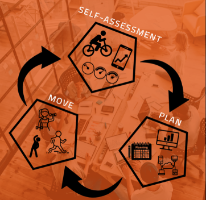DEVELOPMENT AND VALIDATION OF A SELF-ASSESSMENT STATION: TOWARD INDIVIDUALIZED TRAINING RECOMMENDATIONS
 Among other beneficial effects on health, regular physical activity decreases the prevalence of cardiovascular diseases, diabetes, and some cancers. It also alleviates chronic fatigue and improves well-being and quality of life. General recommendations to exercise provided by the World Health Organization or other medical/scientific institutions (i.e. 150 minutes of moderate-intensity aerobic physical activity or 75 minutes of vigorous-intensity physical activity per week) have largely ignored differences in individual characteristics (e.g. age, sex, fitness and clinical status). Just like a GP’s prescription is based on an initial diagnostic, individuals’ recommendations about the volume and the type of physical activity should also be based on objective measurements. The SELFIT project aims at developing a self-directed and mobile assessment station that could test individual physical capacities such as cardiovascular function, strength, flexibility directly at workplaces. The station will then be connected to an app that will prescribe tailored recommendations in terms of physical activity based on those physical and physiological results, the individual’s characteristics (age, BMI, type of job, place of residence) as well as the desires of the employee. The present project will develop and validate the station and will compare whether this ‘individualized prescription’ approach allows to better improve physical fitness and quality of life as compared to the classic recommendations.
Among other beneficial effects on health, regular physical activity decreases the prevalence of cardiovascular diseases, diabetes, and some cancers. It also alleviates chronic fatigue and improves well-being and quality of life. General recommendations to exercise provided by the World Health Organization or other medical/scientific institutions (i.e. 150 minutes of moderate-intensity aerobic physical activity or 75 minutes of vigorous-intensity physical activity per week) have largely ignored differences in individual characteristics (e.g. age, sex, fitness and clinical status). Just like a GP’s prescription is based on an initial diagnostic, individuals’ recommendations about the volume and the type of physical activity should also be based on objective measurements. The SELFIT project aims at developing a self-directed and mobile assessment station that could test individual physical capacities such as cardiovascular function, strength, flexibility directly at workplaces. The station will then be connected to an app that will prescribe tailored recommendations in terms of physical activity based on those physical and physiological results, the individual’s characteristics (age, BMI, type of job, place of residence) as well as the desires of the employee. The present project will develop and validate the station and will compare whether this ‘individualized prescription’ approach allows to better improve physical fitness and quality of life as compared to the classic recommendations.
Keywords: physical activity, sedentary lifestyle, fatigue, dose-response, evaluation, workplace.


